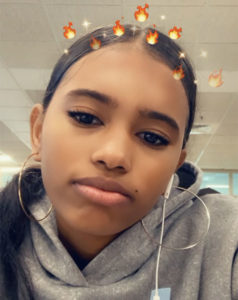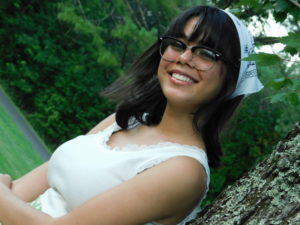Crissanny and Michelle are part of the cohort of youth researchers in the Youth Action Researchers at the Intersection project. They researched the question: What advantages and disadvantages do female students of color face in schools, and how does it affect their learning journeys?
Meet the Student Researchers

Crisanny Martinez (she, her)
Birthplace: Dominican Republic
Family members: Mom, little brother and my aunt, little cousins and five friends
Current favorite song: Overwhelmed by Chloe x Halle
What would people not know just by looking at you: I am very shy.
How you have coped through the pandemic: I have been seen my family and face-timing my friends. I started to paint again and am coloring, baking and cooking.
Why you joined YARI: I wanted to see the steps researchers take to find answers and I wanted to learn how to do this.
Improvements you’d make to education: I think that classrooms should look different for the different types of kids, like the hands-on learners and the others who concentrate differently.

Michelle St. Onge (she, her)
Birthplace: Providence, Rhode Island
Family Members: My mom, two little brothers, and my little sister.
Current favorite song: Baby Girl by Matt Martians.
What would people not know just by looking at you: A lot of people can’t tell I’m mostly Dominican. They usually think I’m Central American (which I am from my mom’s side) or Middle Eastern somehow.
How you have coped through the pandemic: I’ve been cleaning/redecorating a lot more than usual.
Why you joined YARI: I wanted to explore research that had to do with education. My teacher suggested it because at the time I was interested in the education field.
Improvements you’d make to education: I believe making classrooms smaller will help. And possibly getting more than one teacher in the classroom. The reason why a lot of students struggle is because there is only one teacher and 20+ students in a class. The teacher doesn’t have enough time to personally help each individual student.

"It's important to support girls' education because it will increase involvement in the political process and empower more women to promote a better future!" #yari #youthvoice pic.twitter.com/mTWEPcbmlA
— Students at the Center (@StudentCntrHub) December 16, 2020
Interview Responses From the Youth Researchers
Tell us a little about your research project and how the pandemic affected it.
Crisanny/Michelle: We investigated how women of color are treated differently in the school system and its impact on students’ educational journey. We both relate to this topic.
During the pandemic, we struggled to communicate with each other. We both had family and school obligations that kept us busy. It’s been hard during the pandemic and it’s been hard to adjust to it. But even now as it’s still going on, it’s become easier and we’ve communicated more and worked on the project more.
What supports were most helpful in carrying out the project?
Crisanny: My oldest sister helped motivate me to sit in front of the computer and get my work and the project done.
Michelle: For a month and a half, we had a substitute advisor and she was really helpful in helping me with the survey. They motivated me to keep adding things to the project and helped me figure out who to survey and who to interview.
Read the takeaways our adult partners had from working with youth researchers who are twice-exceptional.
What are your future aspirations? How has the YARI project influenced them?
Crisanny: I haven’t thought about what I want to do but I might pursue computer science. I like the idea of being a computer scientist cause they discover new ways to use technology and it’s useful in a lot of careers. The YARI project contributed more than I thought because I realize how important technology can be used to learn more about people.
Michelle: I’ve always been super interested in activism and social justice. With YARI, it pushed me to do more research about women of color and their experiences in school.
What have you learned from this project?
Crisanny: You might feel alone when you go through something but actually lots of people go through it. From this project, I learned about other people’s experiences and how they got over bad stuff that happened to them. It’s a way to cope. I really liked that was the fact that I got to learn more about how the world works, how people see each other and how things really need to change cause it’s unfair about how people get treated.
Michelle: I have learned more researching skills cause it’s something I want to keep doing after high school. And when I was reading the answers we got, it was a lot of what I had went through in middle school. So, it was kind of comforting to know I wasn’t alone.
Read more about the YARI project: goals, activities, local partners and implications.
What advice would you give adults who support learners like you?
Crisanny: Adults need to learn how to listen to kids. It’s important to know what the youth thinks so don’t dismiss them.
Michelle: Keep motivating young people and never stop even if it feels like they’re quitting.
Funding for this study provided by the Nellie Mae Education Foundation and the Oak Foundation.